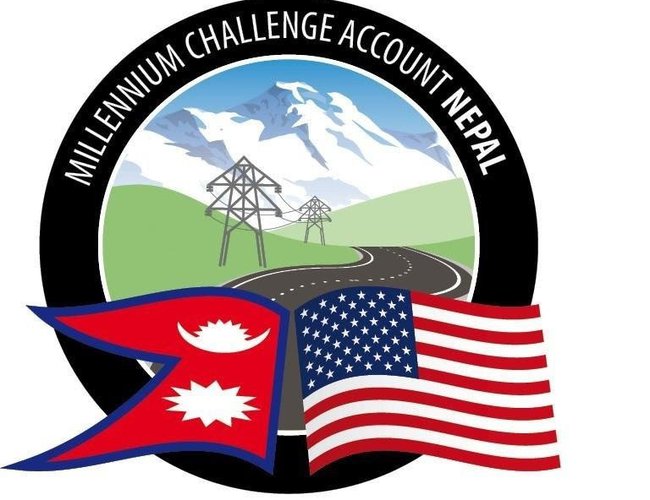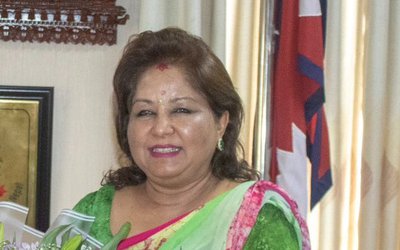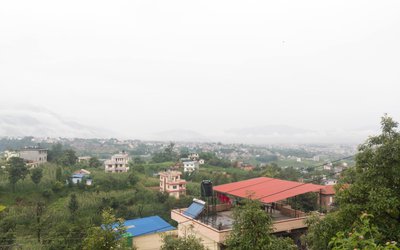
Nepal's Parliament on Sunday ratified a contentious US-funded $500 million grant agreement a day ahead of the February 28 deadline set by Washington, ending months of debates, protests and polarisation in the Himalayan nation.
Finance Minister Janardhan Sharma presented the proposal in the House of Representatives for endorsement of the Millennium Challenge Corporation (MCC) compact along with the Interpretive Declaration. Speaker Agni Prasad Sapkota announced the ratification of the agreement through voice vote despite protests by the main opposition CPN-UML in the lower house.
"I declare that the Millennium Challenge Corporation agreement and its Interpretative Declaration have been endorsed with majority votes,” said Sapkota. He then adjourned the House till March 2.
The agreement, one of the most debated agreements in the country's history over fears that its provisions undermine Nepal's sovereignty, was tabled in the House for ratification on February 20.
The US government had set February 28 as the deadline to endorse the grant project. Earlier in the day, the general deliberations on the proposal took place despite sloganeering by lawmakers belonging to the CPN-UML, which has been disrupting Parliament meetings continuously for the past six months to press for their demands.
Chief Whip of the CPN (Maoist Center) Dev Prasad Gurung said that the MCC agreement should be taken forward only as a purely economic project without violating Nepal's sovereignty and without violating Nepal's constitution and law.
Senior leader of the ruling Nepali Congress Ram Chandra Poudel said that the party has decided to endorse the MCC and an interpretative declaration will be attached with the agreement. He said the declaration will include the statements that the MCC is not part of the Indo-Pacific Strategy, Nepal’s constitution will be above any provisions of the MCC and the country will perceive it purely as an economic assistance.
However, CPN-UML leader Bhim Rawal called on the lawmakers to reject the MCC compact agreement ‘for being treasonous’.
"It is an insult to the country to present the MCC in parliament. It is a betrayal of the country and the people. Those who support it will be national traitors,” Rawal said while participating in the discussion on the agreement in the lower house. He said that Nepal's independence, nationality and sovereignty would be harmed and it should not be ratified.
Prime Minister Sher Bahadur Deuba, who is also chief of ruling Nepali Congress, held hectic political consultations with other parties regarding the endorsement of the project from the Parliament. The ruling alliance partners including CPN-Maoist Centre led by Pushpa Kamal Dahal 'Prachanda' and CPN-Unified Socialist led by Madhav Kumar Nepal agreed to proceed with the deal, but with the inclusion of an interpretative declaration, which is meant for clearing confusion among the general public surrounding the MCC.
The 12-point Interpretive Declaration clearly mentions that being a part of the MCC compact Nepal shall not be bound to be part of the US military strategy or security alliance such as the Indo-Pacific Strategy.
It also mentions that the conduct of the MCC would be if regulated by the prevailing Laws of Nepal and MCC would not have any ownership over intellectual property and Nepal government enjoys the right to nullify the MCC compact within 30 days of issuing a notice if it violates Nepalese laws.
Nepal and the US in 2017 signed the MCC agreement, meant for building Nepal's infrastructure such as electric transmission lines and improvement of national highways.
The MCC is a bilateral United States foreign aid agency established by the US Congress in 2004. It is an independent agency separate from the State Department and USAID. Nepal's political parties were sharply divided on whether to accept the US grant assistance under the MCC agreement.
The MCC also dragged Nepal into a geopolitical game, with Beijing taking a jibe at Washington for providing a "gift" to Nepal with an ultimatum, for a second time in a week, firstly warning the US against using “coercive diplomacy” in Nepal.
China is wary of the US making forays into Nepal, where over the years it wielded influence among the influential Marxist parties. Currently, the Nepali Congress is leading the ruling Coalition in Kathmandu which includes major Left parties - CPN-Maoist Centre CPN-Unified Socialist.
China, whose political influence as well as investments have grown in Nepal significantly, especially under the previous pro-Beijing Prime Minister K P Sharma Oli's tenure, was mostly silent in recent months after Prime Minister Deuba - an advocate of diplomatic balanced foreign policy with close ties with India - took power last year. Under the MCC compact, a 315-km double circuit 400KV transmission line will be constructed.
Five segments of transmission lines to be built are - New Butwal-India Border (18km), New Butwal-New Damauli (90km), New Damauli-Ratmate (90km), Ratmate-New Hetauda (58km), and Ratmate-Lapsephedi (59km). Once completed, these infrastructure projects are expected to provide a vital missing link for power projects of different river basins to the existing high-voltage grid in Nepal.
A part of the $ 500 million will be spent on improving road projects, it said. "With the passage of the compact, which had been in Parliament since July 2019, Prime Minister Sher Bahadur Deuba has pulled off a coup, as he has not only managed to stick to the deadline of February 28 given to the United States, but also saved the coalition from breaking apart," The Kathmandu Post newspaper commented.
Source: PTI
- Japan, China Foreign Ministers Meet In Laos
- Jul 27, 2024
- Obamas Back Harris As Democratic Presidential Nominee
- Jul 27, 2024
- Paris Olympic Games Officially Open With Ceremony Along River Seine
- Jul 27, 2024
- Biden And Netanyahu Discuss Gaza Ceasefire
- Jul 26, 2024
- Paris Olympic Will Start On Saturday
- Jul 25, 2024
















